
About The STEM fatale Initiative
We are seven STEM women and one STEM man who joined forces to expand the initiative “STEM fatale” – join us too!
The name “STEM fatale” is aiming to raise awareness about stereotypes and to break them open. Academic environments in STEM are still fatal for women’s careers. Academia is not devoid of gender cliches, neither might women themselves be aware and devoid of bias, stereotypes and cliches. “STEM fatale” unites all of these aspects and our initiative focuses on overcoming conventional patterns.
In contrast to the classic acronym Science, Technology, Engineering, and Mathematics we are referring to the capital letters of “STEM” and associate them with novel meaning:
Science – S – Survey
Technology – T – Transformation
Engineering – E – Exchange
Mathematics – M – Mentoring
Background
When looking at the participation of women across STEM disciplines and across career stages at universities as illustrated in the “Gender Equality in Science and Research in Austria” Report released by the Austrian Federal Ministry of Education, Science and Research in 2018, it is unfortunately of no surprise that the share of women in STEM disciplines is fairly stable up to a career stage of assistant professors, but drastically drops by approximately 20% at associate professor and professor stage (Figure 1A-B) (Wroblewski & Striedinger 2018*).
Evolution is identical when comparing the numbers from 2006 and 2015, showing that between those years, no progress has been made to increase women’s overall career progression from assistant to associate professor and beyond.
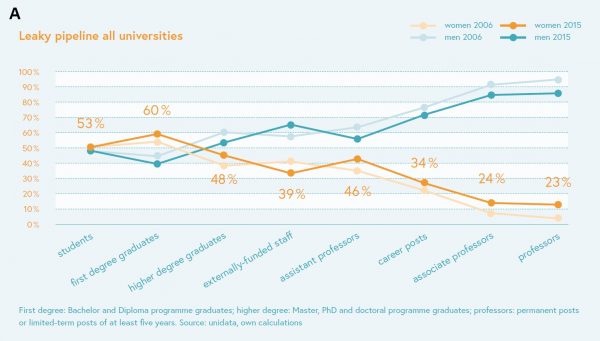
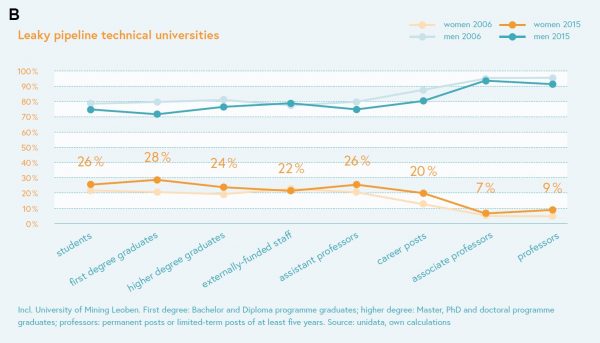
Figure 1: Career trajectories of men in women in 2006 and 2015 for (A) all Austrian universities and (B) specifically technical universities in Austria (from: Wroblewski & Striedinger 2018*).
One possibility might be that women get less chances of equal treatment than men when it comes to faculty applications and appointments. Such inequality can be quantified in the so called glass ceiling index, which measures the probability of equal treatment. The closer the index is to 1.0, the higher the chance for equal treatment.
The glass ceiling index at universities has significantly risen between the years 2005 and 2016: it was rising about 0.23 points from 0.42 to 0.67 for classical universities and rising 0.12 points from 0.32 to 0.44 points at technical universities (Figure 2A), thus most likely not being responsible for the low share of women in academic leadership positions in STEM (Wroblewski & Striedinger 2018*).
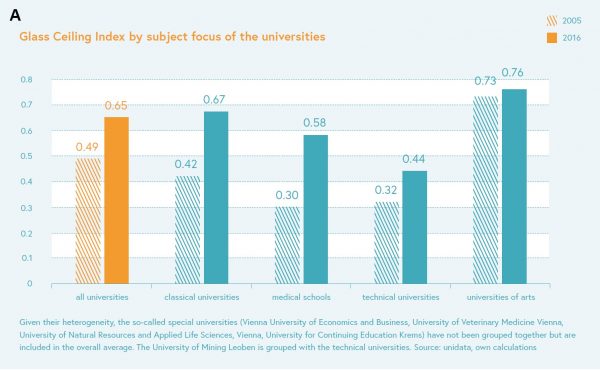
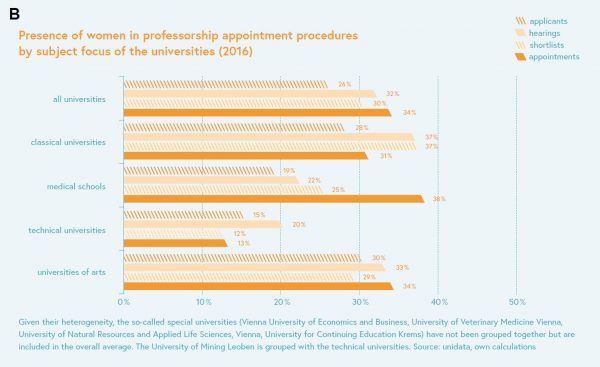
Figure 2: Leadership Position Potential for women in science. (A) Glass Ceiling Index for Austrian universities in 2005 and 2016; (B) percentage of women in faculty recruiting processes in Austria in 2016 (from: Wroblewski & Striedinger 2018*).
One major aspect that has not changed during the last decade is the very low application rate of women in professorship appointment procedures, where they account for only 15% of applications in technical universities and 28% of applications at classical universities (Figure 1B) (Wroblewski & Striedinger 2018*). In other words: while the probability for women being appointed as associate or full professor has significantly risen in the past decade, their share among overall applications has not.
Data acquired over the last decades provide evidence that the low presence of women in professorship appointment procedures is a direct correlate of women displaying a significantly higher degree of self-doubt than men do. Such self-doubt, manifested by limited faith in their professional abilities, in their potential to make valuable contributions to male-based networks and fear from being non-congruent with societal expectations for their behavior exerts a strong negative impact on women’s career trajectories when it comes to top level positions (Abele 2002, Conefrey 2000, Greguletz 2018, Krais 2000, Krais & Beaufoys 2005, Gunter & Stambach 2005, Lind & Löther 2005, Malone 2005, Moser 1999, Seaman 2001*). * please find the full reference list at the bottom of the page.
Therefore, our goals with the STEM fatale initiative are
– to conduct a survey, aiming to identify factors impacting on women’s self-doubt,
– to deduct evidence-based educational and/or societal strategies based on the analysis of our survey,
– to provide women in STEM with a networking and coaching platform, which does not only foster exchange, mentoring and collaboration, but also offers trainings and workshops intended to enhance management, communication and goal-setting skills.
All together the competences acquired from our coaching platform will equip women in STEM with a toolbox and a mindset that convinces them of their suitability for a leadership position.
Who we are

Nicole Amberg
principle investigator at MEDUNI WIEN
Education:
Master studies: molecular biology and zoology (University of Vienna)
PhD studies: PhD in immunology and oncology (Medical University of Vienna, visiting scientist at Université Libre de Bruxelles)
PostDoc: as neuroscientist at IST Austria, the postdoctoral work being supported by a FWF Hertha Firnberg Fellowship Current position: PI at MedUni Vienna, using fetal brain samples and patient-derived iPSCs & cerebral organoids to understand how the brain develops
Career-related activities:
regularly attending career coaching workshops provided by IST Austria, active engagement in outreach events, participating in women’s networking and mentoring platforms (WoMentoring by Club Alpha, FEMtech, FFG’s w-fFORTE, Forbes Women’s Summit), Postdoctoral Association at IST Austria, co-organizer of STEM fatale seminar series at IST Austria.
Message for younger scientists:
We all struggle with something – it’s not the exception but rather the rule. As researchers, we are professionally trained to successfully find alternatives and solutions for long-standing problems. I don’t think that there is any career-related problem we would not be able to solve using a novel conceptual approach for ourselves. Our job gives us the toolbox, we only need to learn how to apply it from the professional perspective at the bench to the personal one for career choices.
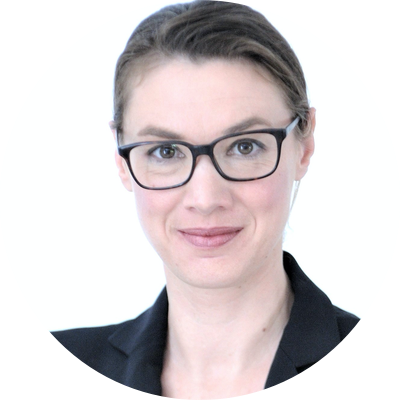
Lisa Cichocki
Communication Expert, Former Scientist
Education:
Master studies: Molecular Biology, Karl-Franzens University Graz
PhD studies: Medical Sciences, Medical University Graz
Postgraduation studies: MBA, WU Executive Academy, Vienna (awarded with Profil-Fellowship)
Current position: Associate Director R&D Communications in the pharmaceutical industry (former Team Lead Events, Team Lead Communications, IST Austria)Career-related activities:
Co-Lead of the company’s women network chapter Austria and Switzerland
participating in networking and mentoring platforms (WoMentoring by Club Alpha, WU EA Female Leaders, Forbes Women’s Summit, #SHELEADS); Froum Alpbach attendee; passion for life-long learning.Message for younger scientists:
Identify your talents and keep going! You will see the bigger picture and a path well chosen only when looking backwards. It’s ok, when priorities and aims change over the years, but keep going. Listen to the supportive people more than to the ones who want to tell you that something is impossible. Because in the end it’s you, who has to believe in yourself! And keep going, keep growing…

Melissa Stouffer
Scientist a:head Bio
Education:
Master studies: Physiology and Neuroscience, New York University
PhD studies: Physiology and Neuroscience, New York University
Postdoc: IST Plus postdoctoral fellow, IST Austria
Current position: Scientist at a:head bio
Career-related activities:
Postdoctoral Association, Diversity and Inclusion group, and co-organizer of the STEM fatale seminar series (all at IST Austria)
Message for younger scientists:
I have worked as a scientist in three countries, and I have always been surrounded by incredible women who were not just intelligent, excellent scientists, but also supportive, collaborative colleagues. In fact, the majority of my fellow PhD students and postdocs have been women. Although leadership positions in scientific research are still primarily held by men, I expect that this will change in my lifetim

Angela Bitto-Nemling
Scientist at JKU Linz
Education:
Master studies: Applied Math (Technical University of Vienna) PhD studies: PhD in Bayesian Statistics (Technical University of Vienna)
Current position: PostDoc in Machine Learning at JKU Linz
Career-related activities:
Member of ISBA – International Bayesian Society; Member of Vienna R Ladies Group; Former BAYSM Board Member;
Message for younger scientists:
Science is great! But it is ninety percent work and ten percent luck. Don’t try to be a genius. Get things done. Struggling during a PhD is part of the PhD program. Find a nice hobby and seek support if you need it. Celebrate the little things and aim big!
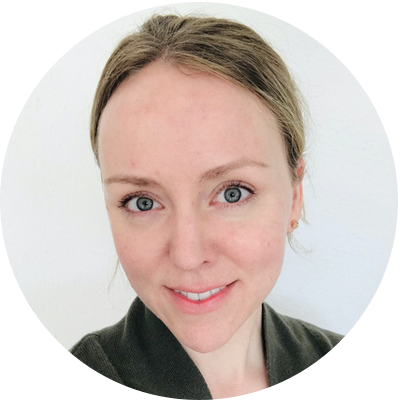
Aglaja Kopf
Scientist at CeMM
Education
Master studies: Molecular Medicine, University of Vienna
PhD studies: PhD in Immunology and Cell Biology, IST Austria
Current position: Postdoc in Translational Immunology at CeMM
Career-related activities
LEAD_able 2020 alumna; ÖGMBT member, training stays at Institut Curie, Paris and Institut Pasteur, Paris; FELASA B certified, teaching assistant, DK NanoCell student representative, managerial and legal training (Project management, General administrative law, Basic concepts of law, Scientific presentation and conduct)
Message for younger scientists
We are often confronted with well-meant advice or criticism on particular things in our CVs, but something you should always keep in mind is that absolutely nobody has a right to your life’s path. What worked well for someone else doesn’t need to work equally well for you and living up to the expectations of others will not make you happy.
It is entirely up to you to decide who you become and what your career should look like.
Oh, and another very useful tip when being at work: Replace ‘F*** you’ with ‘Ok, great’.
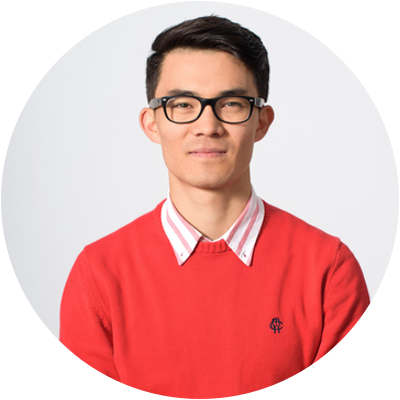
Mojtaba R. Tavakoli
Scientist at IST Austria
Education
Bachelor studies: Undergrad studies in Biology at the University of Vienna
PhD studies: PhD in expansion microscopy, IST Austria
Current position: Research fellow at HHMI Janelia, US
Career-related activities:
Member of Moltag member, Think&Drink committee member at IST Austria , lecturer, active participation at public outreach and science communication events at IST Austria, regularly attending career development workshops provided by IST Austria
Message for younger scientists
Science without passion is transient and conducting science is a privilege. Be passionate about your research and have faith in yourself. Don’t doubt your research, but question the results. Share and discuss your ideas with your peers. Encourage your colleagues, stay positive and keep the spirit for your passion about research.

Irene Vercellino
Group leader at FZ Jülich
Education
Master studies: Molecular Biotechnology at the University of Turin
PhD studies: PhD in Structural Biology, ETH Zurich
PostDoc: IST Plus postdoctoral fellow, IST Austria
Current position: Group leader at Forschungszentrum Jülich, resolving the structures of mitochondrial complexes.
Career-related activities
Teaching Assistant for Electron Microscopy Course at IST Austria, supporter of STEM fatale seminar series at IST Austria
Message for younger scientists
Define your priorities and follow your plan.If you encounter difficulties, actively seek advice and help from senior scientists around you: the fact that support is not voluntarily offered does not mean that nobody is willing to support you. And once you find yourself in a position of power, pay it forward!

Caroline Stremnitzer
Medical Information Manager at Aurimod
Education
Diploma Studies: Molecular Biology at the University of Vienna
PhD studies: PhD in Human Medicine/Immunology, Medical University Vienna
Postgraduation studies: MBA, WU Executive Academy Vienna
Current position: Medical Information Manager at the startup Aurimod in Vienna.
Career-related activities:
Participation in networking and mentoring platforms (WoMentoring by Club Alpha); trainings in communication and conflict management, DSGVO in life sciences, managing 2 small children
Message for younger scientists
For a long time I was convinced that asking questions or asking for help (and thereby admitting not knowing certain things I felt I was supposed to know) is a sign of weakness and just not being good enough. It turns out: no one has all the answers – some are just better in pretending. However, if you start to ask questions or for help, you will not only learn a lot, but be an example helping others to evolve or even find new ideas/answers/projects to work on. Also keep in mind to use your network, to explore your opportunities and try new things!

Anna Breger
Project leader AT UNIVERSITY OF CAMBRIDGE
Education
Master studies: Applied Mathematics at the University of Vienna
PhD studies: PhD in Applied Mathematics at the University of Vienna
Current position: Assistant Research Professor at Cambridge Image Analysis Group
Career-related activities
Analyzing the STEM fatale survey together with a psychologist from University of Vienna, Founder and Co-Editor of the novel Springer book series “Vielfalt der Mathematik”, Team Member of Her Maths Story (https://hermathsstory.eu)
Message for younger scientists
There is no right or wrong path for a successful career, it can be as diverse and different as people are. Do what you love and are passionate about, and don’t be afraid to choose an untypical route – choosing a straightforward career path also does not give you any guarantee of success. In addition to qualification it always needs a portion of luck on top, to be in the right place at the right moment.

Olivia Slepecka-Dobner
PROJECT MANAGER at MINTALITY
Education
Master Studies: Molecular Biology at the University of Vienna
Previous position: Teach for Austria Fellow, Teacher at Modulare Mittelstufe Aspirin, Vienna
Current position: Project Manager at MINTality foundation.
Career-related activities:
Founder of #GirlsGoTech
Message for younger scientists
Shine bright by doing what you love. Follow your passions and dreams. An authentic you is an amazing you.

Katarzyna Kuzmicz-Kowalska
Project Manager AT MEDUNIWIEN
Education
Master studies: Molecular Biology
PhD studies: PhD in Developmental Neuroscience at the Institute of Science and Technology Austria
Current position: Project Manager for the IgG4TREAT Consortium at Medical University of Vienna
Career-related activities
Her own podcast “Science on Trial and Error”
Message for younger scientists
I think academia should be called the alternative career path. There are so many careers and professions within the STEM disciplines. Find the one that fits you best and reach for the top!
References
Abele, Andrea (2002). Geschlechterdifferenz in der beruflichen Karriereentwicklung. Warum sind Frauen weniger erfolgreich als Männer? In: B. Keller & A. Mischaus (Hrsg). Frauen machen Karriere in Wissenschaft, Wirtschaft und Politik. Chancen nutzen – Barrieren überwinden. Baden-Baden: Nomos. S. 49-64
Conefrey, Theresa (2000). Laboratory Talk and Women ́s Retention Rates in Science. In: Journal of Women and Minorities in Science and Engineering. Vol. 6, S. 251-264.
Greguletz, Elena; Diehl, Marjo-Riitta; Kreutzer, Karin (2018) Why women build less effective networks than men: The role of structural exclusion and personal hesitation. In: Human Relations, Volume: 72 (7), p:1234-1261
Gunter, Ramona; Stambach, Amy (2005). Differences in men and women scientist ́s perceptions of workplace climate. In: Journal of Women and Minorities in Science and Engineering. Vol. 11, S. 97-116.
Krais, Beate (2000). Das soziale Feld Wissenschaft und die Geschlechterverhältnisse. Theoretische Sondierungen. In: Krais, Beate (Hg.) (2000): Wissenschaftskultur und Geschlechterordnung. Über die verborgenen Mechanismen männlicher Dominanz in der akademischen Welt. Frankfurt/M.: Campus Verlag, S. 31-54.
Krais, Beate; Beaufays, Sandra (2005). Wissenschaftskultur und Geschlechterordnung: Verborgene Mechanismen der Macht. In: Vogel, Ulrike (2005). Was ist weiblich – was ist männlich? Aktuelles zur Geschlechterforschung in den Sozialwissenschaften. Bielefeld: Kleine Verlag, S. 135-151
Lind, Inken, & Löther, Andrea (2006). Evaluation der Förderinstrumente Berufungstraining und Coaching. In J. Dalhoff (Hrsg.)Anstoß zum Aufstieg – Karrieretraining für Wissenschaftlerinnen auf dem Prüfstand (S. 26-87). Bielefeld: Kleine Verlag.
Malone, Kareen Ror; Nersessian, Nancy J.; Newstetter, Wendy (2005). Gendert writ small: Gender enactments and gendered narratives about lab organizations and knowledge transmission in a biomedical engineering research setting. In: Journal of Women and Minorities in Science and Engineering, Vol. 11, S. 61-81.
Moser, Klaus; Galais, Nathalie; Kuhn, K. (1999). Selbstdarstellungstendenzen und beruflicher Erfolg. In: L. von Rosenstiel; T. Lang-von-Wins (Hrsg.). Existenzgründung und Unternehmertum, S. 181–195. Stuttgart: Schäffer-Poeschel.
Seaman, Rick; Nolan, Kathy; Dwyer, Sonya Corbin (2001). Breaking the cycle: only 1,920 more years to equity. In: Journal of Women and Minorities in Science and Engineering. Vol. 7, S. 19-34.
Wroblewski, Angela; Striedinger, Angelika (2018) Summary – Gender Equality in Science and Research in Austria. Commissioned by the Austrian Federal Ministry of Education, Science and Research
